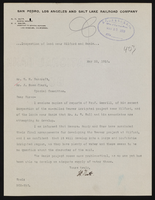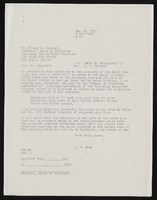Search the Special Collections and Archives Portal
Search Results
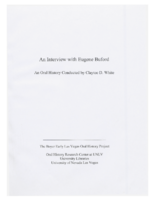
Transcript of interview with Eugene Buford by Claytee D. White, September 12, 2006
Date
Archival Collection
Description
Interview with Eugene Buford conducted by Claytee D. White on September 12, 2006. Buford came to Las Vegas as a child from Birmingham, Alabama. He held a variety of jobs, including washing dishes at the Last Frontier and delivering ice to casinos like the Flamingo and the Stardust, and ultimately retired after thirty-six years with the Post Office. Buford's great grandmother, Mary Nettles, was instrumental in the formation and growth of the NAACP chapter in Las Vegas, and he recalls meetings in her house and his own role as president of the Junior League NAACP. Buford shares memories of historical locations and events such as Helldorado, Block 16, and Carver Park, and several important figures in Las Vegas history, including James B. McMillan, Charles West, Jimmy Gay, Benny Binion, and the mafia.
Text
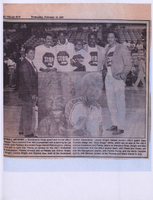
Newspaper clipping, "Basketball Artistry," with photograph of Lonnie Wright with UNLV Basketball Association presenting Reggie Theus with a painting, February 18, 1987
Date
Archival Collection
Description
Lonnie Wright, along with the UNLV Basketball Association, presented a painting to former UNLV athlete Reggie Theus. Lonnie helped design the "Stop Drugs" shirts that the other members are wearing.
Image
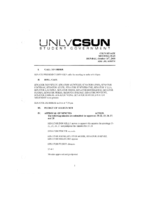
Meeting minutes for Consolidated Student Senate, University of Nevada, Las Vegas, October 10, 2005
Date
Archival Collection
Description
Text
UNLV University Libraries Oral History Collection
UNLV University Libraries Oral History Collection contains oral history interviews that have not been identified as part of a specific project.
Corporate Body

Transcript of interview with Vincent "Vince" Hart by Andrew Bannister, February 21, 1980
Date
Archival Collection
Description
On February 21, 1980, Andrew Bannister interviewed Vincent “Vince” Hart (born on July 7, 1945 in Jerusalem, Palestine) in Hart’s office about his experience with youth soccer, both as a coach and as a player. Hart discusses his family background and his residential history in the United Kingdom and the United States before explaining the development of the men’s soccer team at the University of Nevada, Las Vegas. He describes his impact on the program and his hopes for future student athletes. The two then delve into a discussion of the fundamentals of soccer and different strategies that are commonly used. They then conclude with a brief description of Vince’s experiences with meeting a variety of professional soccer players at the Las Vegas Stadium.
Text

Jack L. Monroe Jr. interview, March 15, 1981: transcript
Date
Archival Collection
Description
On March 15, 1981, Marie Carmichael interviewed Jack L. Monroe Jr. (b. 1937 in St. Helena, California) about his life in Las Vegas, Nevada and his work as a cook among many other topics. Monroe speaks initially about his time working alongside his family in the restaurant business, with his father working as a cook, his mother a waitress and himself as both a busboy and a cook. He discusses the working conditions of cooks, the competition between casino restaurants and the relationship between workers, bosses and the public. Moreover, Monroe speaks about life in Las Vegas as a youngster, the significance of YMCA, summer camps and other recreational activities, and the school system. Lastly, he talks about the changing infrastructure of the city, the paved roads and public transportation, how casinos made their profits and the attachment residents develop towards the city of Las Vegas.
Text

Transcript of interview with Eugene Williams conducted by Claytee D. White, July 18, 2008
Date
Archival Collection
Description
Transcript of interview with Eugene Williams conducted by Claytee White on July 18, 2008. Williams discusses his life as a singer with various musical groups including the Coasters and the Platters, and traveling all over the United States and Europe. He left the Platters in 1990 and settled in Las Vegas. He was part of the Sound of the Platters group in the early 2000s.
Text


